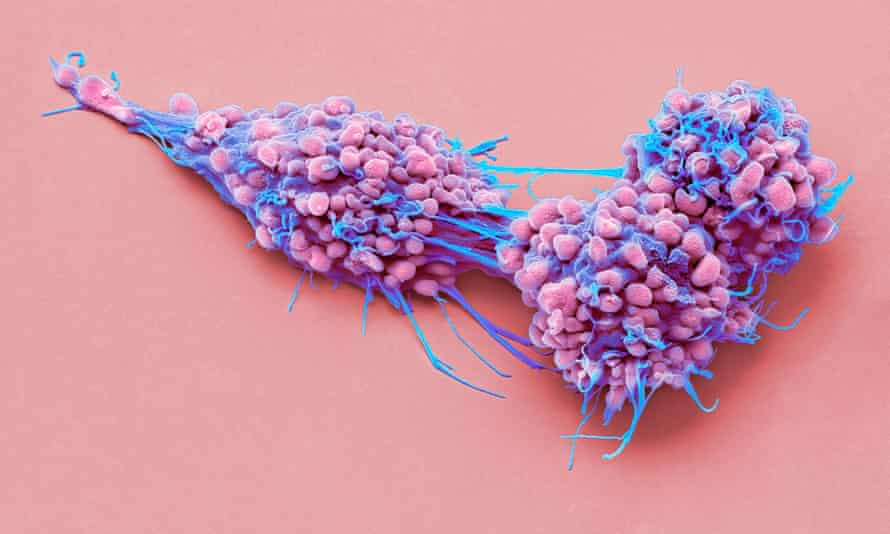New drug combination shrunk tumours significantly in 46% of patients with treatment-resistant form of disease

Thousands of women with ovarian cancer could benefit from a revolutionary drug combination after it was shown to shrink tumours in half of patients with an advanced form of the disease.
The pair of drugs – which work together to block the signals cancer cells need to grow – could offer a new treatment option for women with a type of ovarian cancer that rarely responds to chemotherapy or hormone therapy.
Experts said the “fantastic” results from early trials of the new drug combination, presented at the European Society for Medical Oncology congress, suggested the treatment was highly effective. They were so successful that a phase 2 trial is already under way.
Researchers said they were delighted with the outcome, and hope it could mean a significant advance in treatment if the results are replicated in larger trials.
The phase 1 trial, led by a team at the Institute of Cancer Research (ICR) in London and the Royal Marsden NHS Foundation Trust, tested the drugs VS-6766 and defactinib in patients with low-grade serous ovarian cancer.
Experts said this type of cancer tends to develop at a younger age, less than 13% of patients respond to chemotherapy and less than 14% respond to hormone therapy.
Trial results show that of the 24 patients evaluated, 46% saw their tumours shrink significantly in response to the treatment.
The outcomes were even better in patients with a particular mutation, with 64% who have KRAS-driven tumours seeing them shrink after treatment. The researchers said this indicated that tumour profiles could be used to identify which patients are most likely to benefit from the new treatment.
They said those taking part in the trial – aged between 31 and 75 – lived for an average of 23 months before their cancer progressed.
“Overcoming cancer’s ability to evolve resistance to treatment is a huge challenge for cancer research,” said Prof Kristian Helin, the chief executive of the ICR. “This study has turned a deep understanding of how cancer fuels its growth and develops resistance into a highly targeted treatment for patients who currently have few treatment options.”
Dr Susana Banerjee, also from the ICR and consultant medical oncologist and research lead at the Royal Marsden’s gynaecology unit, said: “If these findings are confirmed in larger trials, they’ll represent a significant advance in low-grade serous ovarian cancer treatment.”
The combination treatment worked even in patients who had already received an MEK inhibitor – something which can cause tumours to shrink but tends to stop working as tumours develop resistance to treatment – before the study, Banerjee said.
She added: “I am delighted that this drug combination has worked so well in a group of patients who are in urgent need of new treatments, including those who have previously been treated with a MEK inhibitor. We’re very hopeful that this could become the standard of care for women with low-grade serous ovarian cancer.”
Separately at the European Society for Medical Oncology congress, the trial of a new drug to treat a form of breast cancer was hailed as “groundbreaking”, with results said to suggest a strong trend towards improved overall survival.
AstraZeneca said Enhertu demonstrated a 72% reduction in the risk of disease progression or death in women with HER2-positive metastatic breast cancer compared with a different medicine.
The trial, involving about 500 patients in Asia, Europe, North America, Oceania and South America, found there was “a strong trend towards improved overall survival” with Enhertu. But it was also pointed out that this analysis was “not yet mature and is not statistically significant”.
Dr Kotryna Temcinaite, a senior research communications manager at Breast Cancer Now, said: “These are incredibly promising results, and we now hope that further research will show whether this treatment could also offer patients precious extra time to live and be there for more moments that matter.”

Leave A Comment